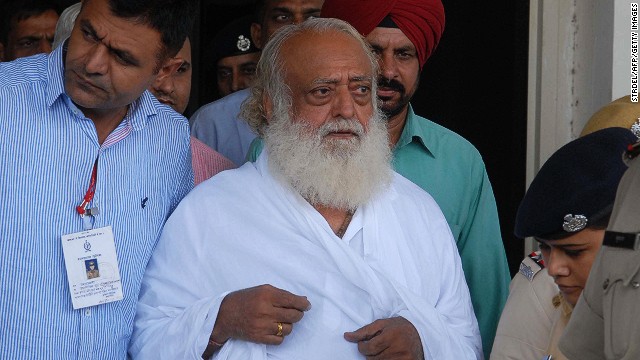Holy man castrates self after India guru charged with rape of 16-year-old girl

Hong Kong (CNN) -- A Hindu holy man castrated himself in India Wednesday following the arrest of popular preacher Asaram Bapu, revered by millions across the country for his sermons on enlightenment. Police have charged the 72-year old guru with raping a 16-year-old schoolgirl at one of his ashrams, or religious centers, in August.
Authorities in the northern Indian state of Uttar Pradesh found Baba Premdas, a 60-year old follower of Bapu, bleeding at his home in Amethi from apparently self-inflicted wounds, city police chief Alankrita Singh told CNN. Premdas was admitted to a local hospital and then taken to a bigger health facility for surgery where his condition "is stable", said Singh.
Asked whether his act was related to the arrest of Asaram Bapu, Singh added, "We have heard such things, but all this is unconfirmed."
"Some say it was because of Bapu's arrest," said Singh to AFP earlier, "some say it was because he feared ending up in Bapu's situation. No one knows."
Bapu has denied the sexual assault allegations leveled by the teenage girl and her parents, both devotees of the guru. The elderly preacher has also claimed he is physically incapable of rape but police say medical tests show him to be in good shape.
"The team of doctors is saying he is perfectly, medically, mentally and physically fit," said Ajayal Lamba, Deputy Commissioner of Police in Jodhpur.
Bapu, also referred to as the "godman" in local Indian media, is currently in jail awaiting trial after a court rejected his bail plea earlier this week, public prosecutor Anand Purohit told CNN. The prosecution plans to present a detailed dossier of the charges in the trial soon, he said.
This month's unfolding rape case against Bapu is just the latest in a series of sexual assault incidents in India since late 2012 that have gained high-profile attention both for their frequency and ferocity.
It was the gang rape and murder of a 23-year-old student in New Delhi last December that galvanized Indian society and the media in particular, to examine the pervasive incidence of rape and other forms of violence against women. The barbarity of the crime ignited a wide-ranging discussion across all levels of the Indian media and prompted multiple debates in the national and regional assemblies. Stung into action by public outrage, the government instituted new laws and crucially stricter punishments, which includes the death penalty when victims are killed or left in a vegetative state.
Furthermore in a sharp departure with previous practice, predatory behavior such as voyeurism, stalking and groping can now lead to arrest and punishment. India's court system is now making greater use of fast-track trials to prosecute the most heinous and high-profile crimes against women. Local and national media have maintained their spotlight on sexual assaults and other violence against women, leading to a torrent of disturbing reports following last December's horrific rape incident.
In March, at least five men from a local tribe gang-raped a Swiss woman camping with her husband in a forest in India's Datia district. A court convicted six men to life in prison four months later.
In April, a 4-year-old Indian girl was raped by a 35-year-old man in India's central Maharashtra state. The girl suffered brain damage and was in a coma for two weeks before dying from cardiac arrest.
And in June, at least three men gang-raped a 31-year-old American tourist in northern India after she visited the Vashishth Temple after midnight. She accepted a ride from the group after failing to find a taxi. They drove her to a wooded area where they assaulted her.
While such incidents have been covered extensively by international news media, an even larger number of cases are only reported in domestic Indian news outlets -- and an unknown number simply go unreported.
Just this week in local media, the Times of India reported two men gang-raped a 27-year-old woman who had gone to a local dairy in northern Uttar Pradesh state, the Hindustan Times reported at least six to seven girls were lured to and raped at a deserted steel mill south of Mumbai over the past half year, and the Indian Express reported the story of a 14-year-old girl who was allegedly raped by two people over several months in western Gujarat state. Villagers discovered the girl was pregnant but later miscarried twin babies.
According to India's National Crime Records Bureau, the country recorded 24,923 cases of reported rape in 2012 -- a 57% rise in reported cases since 2003. This number is widely considered to be extremely underreported for a country of more than 1 billion people. The United States, with a population of more than 310 million, recorded 270,000 cases of rape in 2010, the most recent year for which national rape statistics are available.
